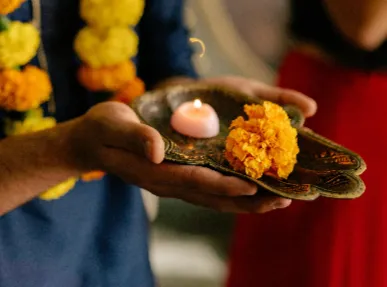Call for Hindu chaplains in SAPS Service
Spiritual support

Pundit Satish Maharaj is working with the SAPS to establish new-criteria for the appointment of Hindu chaplains.
Image: Yan Krukau/Pexels.com
RELIGIOUS organisations have raised the alarm over the ongoing absence of Hindu chaplains within the South African Police Service (SAPS). They say there is a need for spiritual support in a diverse and multifaceted society.
Pundit Satish Maharaj, who served as a Hindu chaplain for the SAPS for more than three decades, said following his retirement, and the retirement of other Hindu chaplains over the years, the positions in KwaZulu-Natal and Gauteng had not been filled.
He is now working with the SAPS to establish new-criteria for the appointment of Hindu chaplains.
“According to the current criteria, a Hindu chaplain is required to have matric, be ordained by a recognised religious organisation, and be in possession of an academic qualification in relation to the religion. This is unlike Christians, who are able to acquire a certificate, degree or diploma in theology or biblical studies from an institution such as a university," said Maharaj.
"Hindu priests are now disadvantaged because the demand for the Hindu religious studies has been low. It was stopped many years ago at institutions, and there are currently no courses offered.
“I have now been tasked to draw up new criteria. I have interacted with the different linguistic groups to find a suitable criteria that will benefit Hindu priests who want to be chaplains in the SAPS, but also enable them to be promoted. I intend to complete this task over the next two weeks, and make my final submissions to the SAPS."
Ram Maharaj, president of the South African Hindu Dharma Sabha (SAHDS), formally addressed this concern in a letter to the head of spiritual services at the SAPS earlier this month.
“The SAHDS has respectfully requested their office ensure that Hindu chaplains are provided for essential services, inter alia, for counselling, consolation, guidance, elimination of gender-based violence, conflict resolution, reduction of drug and alcohol abuse, and general social upliftment services for the Hindu community particularly in hours of need.
“The provision of the vital services will pro-actively motivate and enhance the performance of Hindu members of the SAPS and raise the level of morale, patriotism and work ethics. Moreover, it will raise the level of God-consciousness and moral regeneration and improve the quality of life of all South Africans."
Professor Brij Maharaj, the deputy president of the South African Hindu Maha Sabha (SAHMS), said the organisation was concerned that positions of Hindu chaplains in the SAPS remained vacant.
He said the SAHMS’s motivations for a Hindu chaplain in the SAPS were influenced by various factors, such as the spiritual and emotional needs of Hindu police officers, and individuals affected by police actions needed to be met.
“Police face difficulties that can be emotionally and mentally exhausting. A Hindu chaplain would offer religious guidance, counselling, and support to help them deal with the stresses and trauma tied to their jobs. This chaplain could also assist officers in their interactions with Hindu communities and when addressing culturally specific matters, like religious festivals and dietary needs. This could strengthen the relationship between the police and the Hindu community by building trust and understanding.”
Maharaj said appointing a Hindu chaplain would also remind everyone of the country's dedication to interfaith harmony, peace, and mutual respect.
“The SAHMS’s call for Hindu chaplains underscores the need for recognising the Hindu community in the same way other faith groups have their chaplains and counsellors within the police force. This need aligns with the goal of promoting religious tolerance and inclusivity in South Africa, a country that has long struggled to balance the diverse needs of its communities.
“Furthermore, appointing Hindu chaplains would also affirm the country's commitment to equality and inclusion in all areas of public life. It acknowledges the varied needs of different cultural and religious groups in South Africa.
"This recognition is particularly important in South Africa, where individuals of Indian descent, many of whom are Hindus, have faced challenges with integration and equality in the post-apartheid era,” he said.
The national SAPS did not respond at the time of publication.